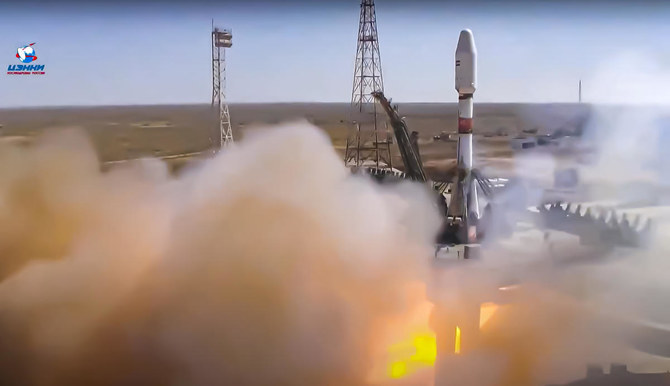TEHRAN: Iran dismissed as “childish” Wednesday claims by the United States that an Iranian satellite launched by Russia is intended for spying.
The satellite, called Khayyam, was launched into space on a Soyuz-2.1b rocket from the Russian-controlled Baikonur Cosmodrome in neighboring Kazakhstan on Tuesday.
Responding to the launch, Washington said Russia’s growing cooperation with Iran should be viewed as a “profound threat.”
“We are aware of reports that Russia launched a satellite with significant spying capabilities on Iran’s behalf,” a US State Department spokesperson said.
The head of Iran’s Space Agency, Hassan Salarieh, told reporters Wednesday that the spying allegation was “basically childish.”
“Sometimes, some comments are made to incite tensions; saying that we want to spy with the Khayyam satellite... is basically childish,” he said.
“The Khayyam satellite is entirely designed and built to meet the needs of the country in crisis and urban management, natural resources, mines, agriculture and so on.”
Ahead of the launch, there was speculation that Russia might borrow Iran’s satellite temporarily to boost its surveillance of military targets in Ukraine.
Last week, The Washington Post quoted anonymous Western intelligence officials as saying that Russia “plans to use the satellite for several months or longer” to assist its war effort before allowing Iran to take control.
Iran’s space agency stressed on Sunday that it would control the satellite “from day one” in an apparent reaction to the Post’s report.
The purpose of Khayyam is to “monitor the country’s borders,” enhance agricultural productivity and monitor water resources and natural disasters, according to the space agency.
Khayyam is not the first Iranian satellite that Russia has put into space.
In 2005, Iran’s Sina-1 satellite was deployed from Russia’s Plesetsk Cosmodrome.
Iran insists its space program is for civilian and defense purposes only, and does not breach the 2015 nuclear deal, or any other international agreement.
Western governments worry that satellite launch systems incorporate technologies interchangeable with those used in ballistic missiles capable of delivering a nuclear warhead, something Iran has always denied wanting to build.
Iran successfully put its first military satellite into orbit in April 2020, drawing a sharp rebuke from the United States.
Iran scoffs at claims Russia-launched satellite for ‘spying’
https://arab.news/26b4u
Iran scoffs at claims Russia-launched satellite for ‘spying’

- The satellite, called Khayyam, was launched into space from the Russian-controlled Baikonur Cosmodrome
- Iran insists its space program is for civilian and defense purposes only, and does not breach the 2015 nuclear deal
Israel agrees to ‘limited reopening’ of Rafah crossing: PM’s office

- The announcement came after visiting US envoys reportedly pressed Israeli officials to reopen the crossing, a vital entry point for aid into Gaza
JERUSALEM: Israel said Monday it would allow a “limited reopening” of the Rafah border crossing between Gaza and Egypt once it had recovered the remains of the last hostage in the Palestinian territory.
The announcement came after visiting US envoys reportedly pressed Israeli officials to reopen the crossing, a vital entry point for aid into Gaza.
Reopening Rafah forms part of a Gaza truce framework announced by US President Donald Trump in October, but the crossing has remained closed after Israeli forces took control of it during the war.
The Israeli military also said it was searching a cemetery in the Gaza Strip on Sunday for the remains of the last hostage, Ran Gvili, a non-commissioned officer in the police’s elite Yassam unit.
Prime Minister Benjamin Netanyahu’s office said the reopening would depend on “the return of all living hostages and a 100 percent effort by Hamas to locate and return all deceased hostages,” Netanyahu’s office said on X.
It said Israel’s military was “currently conducting a focused operation to exhaust all of the intelligence that has been gathered in the effort to locate and return” Gvili’s body.
“Upon completion of this operation, and in accordance with what has been agreed upon with the US, Israel will open the Rafah Crossing,” it said.














